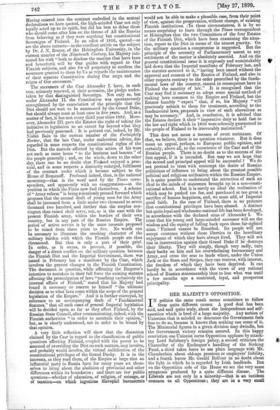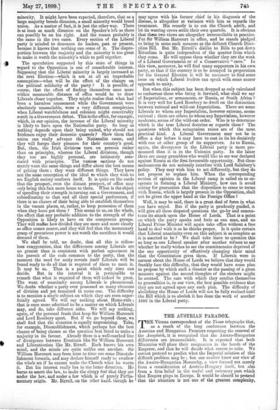HER MAJESTY'S OPPOSITION.
TN politics the same result seems sometimes to follow 1 from quite different causes. A good deal has been said, and said quite truly, about the independence and self- assertion which is bred of a large majority. Any section of Unionists that is minded to denounce the Government feels free to do so, because it knows that nothing can come of it. The Ministerial figures in a given division may dwindle, but the Government victory remains assured. In this happy conviction one Unionist earns Opposition applause by attack- ing Lord Salisbury's foreign policy, a second criticises the Chancellor of the Exchequer's handling of the Sinking Fund, a third takes leave to use plain language with Mr. Chamberlain about old-age pensions or employers' liability, and a fourth leaves Mr. Gerald Balfour in no doubt about the light in which he is regarded by Irish landlords. But on the Opposition side of the House we see the very same tymptoms produced by a quite different disease. The Liberals are not only in a minority—that is an incident common to all Oppositions; they are in a very small minority. It might have been expected, therefore, that as a large majority breeds disunion, a small minority would breed union. As a matter of fact, it is just the other way. There is at least as much disunion on the Speaker's left as there can possibly be on his right. And the reason probably is the same in the two cases. Every section of the Liberal y is minded to denounce its leaders, past or present, use it lmows that nothing can come of it. The dispro- portion between the majority and the minority is too great to make it worth the minority's while to pull together.
• The speculation suggested by this state of things in regard to the Opposition is one of considerable interest. Supposing that the Liberal minority is largely increased at the next Election—which is not at all an improbable assumption—what will be the effect of the change on the political solidarity of the party ? It is possible, of course, that the effect of finding themselves once more within measurable distance of office would be to draw Liberals closer together. They might realise that what had been a harmless amusement while the Government were absolutely unassailable, wore a very different complexion when Liberal watchfulness and cohesion might conceivably result in a Government defeat. This is the effect, for example, which, in our opinion, the increase of the Liberal minority is likely to have, upon the Nationalist party. So long as nothing depends upon their being united, why should not Irishmen enjoy their domestic quarrels ? Show them that union can really advance the Nationalist cause, and they will forego their pleasure for their country's good. But, then, the Irish divisions turn on persons rather than on principles, whereas the Liberal divisions, though they too are highly personal, are intimately asso- ciated with principles. The various sections do not merely want the same things and differ about the best means of getting them ; they want different things. They have not the same conception of the ideal to which they wish to see English society conform itself. It is quite on the cards that the prospect, even the distant prospect, of office may only bring this fact more home to them. What is the object of spending their strength in turning out a Government, and subordinating to that end all their special preferences, if there is no chance of their being able to establish themselves in the vacant places, or, rather, to keep possession of them when they have got them ? This seems to us, on the whole, the effect that any probable addition to the strength of the Opposition is likely to have on the component groups. They will realise how divided they are more and more clearly as office comes nearer, and they will feel that the momentary grasp of precarious power is not worth the sacrifices it would demand of them.
We shall be told, no doubt, that all this is ridicu- lous exaggeration, that the differences among Liberals are no greater than is consistent with perfect agreement in the pursuit of the ends common to the party, that the moment the need for unity reveals itself Liberals will be found ready to do all that is required of them to meet it. It may be so. That is a point which only time can decide. But in the interval it is permissible to remark that what is required of them will indeed be great. The want of unanimity among Liberals is phenomenal. We doubt whether a party ever possessed so many elements of division and yet remained in name one. The difficulty is to mention a single subject on which they are even super- ficially agreed. We will say nothing about Home-rule ; 'that is once more admitted to be a matter on which Liberals may, and do, take different sides. We will say nothing, again, of the personal feuds that keep Sir William Harcourt and Lord Rosebery apart. But if we go beyond these, we shall find• that the situation is equally unpromising. Take, for example, Disestablishment, which perhaps has the best chance of being chosen as the question best fitted to unite a majority in its favour. Already there is a well-marked line of divergence between Erastians like Sir William Harcourt and Liberationists like Mr. Birrell. Each knows his own mind, and the minds are quite unlike one another. Sir William Harcourt may from time to time use some Disestab- lishment formula, and may declare himself ready to swallow the whole set if he cannot make the Church what he wants it. But his interest really lies in the latter direction. He burns to assert the law, to make the clergy feel that they are under the law, and under a law which is of purely Parlia- mentary origin. Mr. Birrell, on the other hand. though he may agree with his former chief in his diagnosis of the disease, is altogether at variance with him as regards the treatment. His remedy is to cut the Church adrift, and let its warring crews settle their own quarrels. It is obvious that these two views are altogether irreconcilable in practice. Put Sir William Harcourt in office, and he stands pledged. to bring in some such measure as the defunct Church Disci- pline Bill. But Mr. Birrell's dislike to Bills to put down Ritualism is quite independent of the quarter from which they come. He will oppose them whether they are the work of a Liberal Government or of a Conservative "cave." In this view' moreover, he will find many supporters in his own party, so that if the country is to be stumped in preparation for the General Election it will be necessary to find some issue on which Liberal leaders can speak with some nearer approach to unity.
But when this subject has been dropped as only calculated to embarrass those who bring it forward, what shall we say of Imperialism, or armaments, or Russia, or South Africa ? It is very well for Lord Rosebery to dwell on the distinction between rational and wild-cat Imperialism. There are some Liberals to whom any Imperialism, however extreme, seems rational ; there are others to whom any Imperialism, however moderate, seems of the wild-cat order. Who is to determine which is the true Liberal doctrine as regards these? The questions which this antagonism raises are of the most practical kind. A Liberal Government may not be in office a day before it may have to cast in its lot decisively with one or other group of its supporters. As to Russia, again the divergence in the Liberal party is more pro- nouncld than it is in the Unionist party. In the latter there are many grumblers who would like to see war declared against Russia at the first favourable opportunity. But these malcontents do not seriously interfere with Lord Salisbury's policy. They may wish him to act differently, but they do not propose to replace him. When the corresponding section of opinion in the Liberal camp is called on to co- operate in forming a Liberal Ministry, how can it avoid asking for guarantees that the disposition to come to terms with Russia, which is largely present in the Op lion, shall not be given the upper hand at the Foreign 0 ?
Well, it may be said, there is a great deal of force in what you have urged. But if the party is prudently guided, it will give all these disputed questions the go-by and concen- trate its attack upon the House of Lords. That is a point on which the party speaks and feels as one man, and no Liberal Prime Minister will again take office without a free hand to deal with it as he thinks proper. Is it quite certain that Liberal unanimity even on this subject is as complete as it is asserted to be ? We shall take leave to question this so long as one Liberal speaker after another refuses to say whether he really wishes to see the constituencies deprived of the one opportunity of effectively changing their mind that the Constitution gives them. If Liberals were in earnest about the House of Lords we believe that they would frankly face this difficulty, that they would have some plan to propose by which such a disaster as the passing of a great measure against the second thoughts of the electors might be averted. The care with which they confine themselves to generalities is in our view, the best possible evidence that they are not agreed upon any such plan. The difficulty of abolishing the House of Lords will not be fully realised until the Bill which is to abolish it has done the work of another 1886 in the Liberal party.







































 Previous page
Previous page